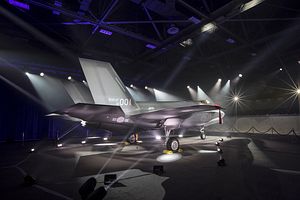Amid ongoing diplomatic tensions between the United States and North Korea involving the latter’s nuclear program, defense industrial cooperation between the United States and South Korea remains robust and, in fact, is more bustling than ever before. For instance, as of 2018, the Republic of Korea is the fourth largest purchaser of U.S. military goods and services. Since the onset of the Trump administration, Seoul has procured a variety of U.S.-manufactured defense goods, including a total of 40 F-35A Lightning II fifth-generation stealth fighters, in the form of Foreign Military Sales.
In exporting defenses articles and services abroad, the United States primarily relies on Direct Commercial Sales (DCS) and Foreign Military Sales (FMS). DCS refers to the type of arms sale whereby a U.S. defense contractor directly deals with a foreign government or buying entity. FMS, on the other hand, involves an arms trade between the U.S. government and its foreign counterpart. In an FMS program, which is governed by the Arms Export Control Act, a foreign government enters into an agreement with U.S. government to purchase defense articles and services on a no-profit and no-loss basis.
In addition, U.S. defense contractors are partaking in local South Korean defense projects. For instance, Raytheon Company, which has just announced a mega merger deal with United Technologies, will be the sole supplier of Identification Friend or Foe (IFF) transponders for South Korea’s naval-based and airborne IFF Mode-5 upgrade projects. As part of that, Raytheon Company will also provide technological training and assistance to enable the prime contractor, Hanwha Systems, to localize the transponder devices in accordance with the project requirements.
In this milieu of mutual industrial cooperation, Seoul revised its offset guidelines toward the end of last year. Under South Korea’s offset guidelines, an offset transaction may arise when procuring military supplies from a foreign defense contractor in excess of $10 million. As a condition for such a transaction, the country’s Defense Acquisition Program Administration (DAPA) may require the foreign contractor to undertake certain activities in the form of, for example, transfer of technologies or export of locally manufactured supplies and parts. These activities will be undertaken with a Korean Industrial Partner (KIP) at a value mutually agreed between DAPA and the overseas contractor.
The most salient feature of South Korea’s latest offset program is the inclusion of a banking system. Under this newly introduced system of offset credit deposits, a foreign contractor is free to pursue offset-related activities with a KIP, including manufacturing and export of weapon system parts, export of defense items, and military-related repair and maintenance. Once DAPA approves the foreign contractor’s offset banking proposal, the contractor will then go on to implement the approved activity in collaboration with its KIP. Upon completion of the transaction, DAPA will review the outcome and assign a value to it, and the contractor is free to collect the assigned value as offset credit for later use in connection with a South Korean defense project.
The primary focus of Seoul’s new offset banking regime is promoting cross-border commercial collaborations between foreign contractors and the country’s small- to medium-sized enterprises (SME). Thus, if a foreign contractor successfully implements a project involving the manufacturing and export of weapon system parts in tandem with a Korean SME, the amount of offset credit assignable at the end of the day will be three times the assessed value of the underlying project. This scheme will presumably incentivize foreign contractors to seriously consider and capitalize on the benefits of the banking regime.
Introduction of an offset banking system is in alignment with the Moon administration’s ongoing emphasis on SMEs and venture startups as the backbone of the country’s economic growth initiatives. In this overall framework of promoting global industrial cooperation in support of SMEs, DAPA and the Korean Ministry of SMEs and Startups recently hosted an initiative called “2018 Offset Industry Week” in the city of Busan. Lockheed Martin, General Electric, and 3M were some of the participants, along with more than 80 Korean SMEs.
As emphasized by South Korea’s Defense Minister Jeong Kyeong-doo during his keynote speech at a recent defense forum, Korea’s defense industry will operate as an important driver of the country’s export-oriented economy. The new offset regime will no doubt play an important tactical role in this regard. Given South Korea’s ongoing serious commitment to procure and deploy U.S. weapon systems on Korean soil, the new banking regime, if successfully promoted and implemented, will contribute to creating numerous win-win business cases for the United States and South Korea alike.
Joe Cho is a government contract lawyer in South Korea and currently a Senior Legal Advisor to Hanwha Systems Co., Ltd. The views expressed here solely belong to the author.

































